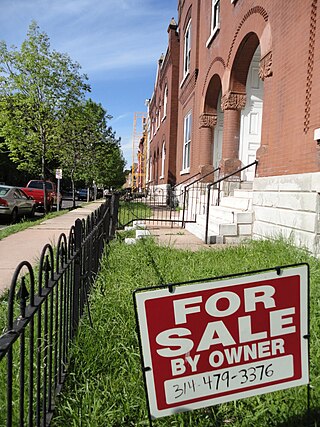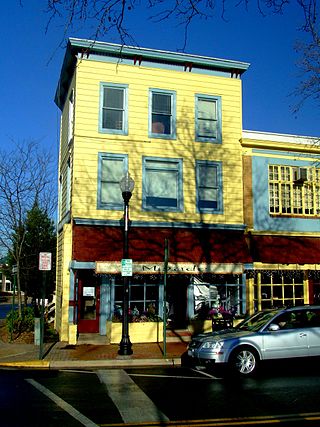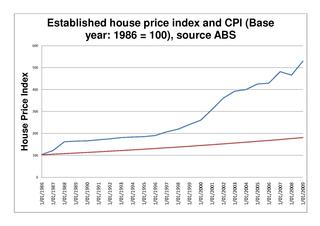Real estate agents and real estate brokers are people who represents sellers or buyers of real estate or real property. While a broker may work independently, an agent usually works under a licensed broker to represent clients. Brokers and agents are licensed by the state to negotiate sales agreements and manage the documentation required for closing real estate transactions. Buyers and sellers are generally advised to consult a licensed real estate professional for a written definition of an individual state's laws of agency.
Stamp duty is a tax that is levied on single property purchases or documents. A physical revenue stamp had to be attached to or impressed upon the document to show that stamp duty had been paid before the document was legally effective. More modern versions of the tax no longer require an actual stamp.
Real estate appraisal, property valuation or land valuation is the process of developing an opinion of value for real property. Real estate transactions often require appraisals because they occur infrequently and every property is unique, unlike corporate stocks, which are traded daily and are identical. The location also plays a key role in valuation. However, since property cannot change location, it is often the upgrades or improvements to the home that can change its value. Appraisal reports form the basis for mortgage loans, settling estates and divorces, taxation, and so on. Sometimes an appraisal report is used to establish a sale price for a property.
A real-estate bubble or property bubble is a type of economic bubble that occurs periodically in local or global real estate markets, and it typically follows a land boom. A land boom is a rapid increase in the market price of real property such as housing until they reach unsustainable levels and then declines. This period, during the run-up to the crash, is also known as froth. The questions of whether real estate bubbles can be identified and prevented, and whether they have broader macroeconomic significance, are answered differently by schools of economic thought, as detailed below.

For sale by owner (FSBO) is the process of selling real estate without the representation of a broker or agent. Homeowners may employ the services of marketing, online listing companies, or market their own property. Typically, they represent themselves with the help of a lawyer or solicitor throughout the sale. As in most areas, there are detailed legal requirements pertaining to sellers and disclosures they must make.
Flipping is a term used to describe purchasing an asset and quickly reselling it for profit.

Commercial property, also called commercial real estate, investment property or income property, is real estate intended to generate a profit, either from capital gains or rental income. Commercial property includes office buildings, medical centers, hotels, malls, retail stores, multifamily housing buildings, farm land, warehouses, and garages. In many U.S. states, residential property containing more than a certain number of units qualifies as commercial property for borrowing and tax purposes.
An electronic version of the real estate industry, Internet real estate is the concept of publishing housing estates for sale or rent online, and for consumers seeking to buy or rent properties through such platforms. Often, Internet real estate properties are listed and managed by landlords themselves. However, there are few exceptions where an online real estate agent would exist, still dealing via the World Wide Web and often stating a flat fee and not a commission based on the percentage of total sales. Internet real estate platforms surfaced around 1999 when technology advanced and statistics prove that more than 1 million homes were sold by the owners themselves in the United States alone in 2000. Some of the primary Internet real estate platforms include Zillow, Trulia, Yahoo! Real Estate, Redfin and Realtor.com.
A real estate trend is any consistent pattern or change in the general direction of the real estate industry which, over the course of time, causes a statistically noticeable change. This phenomenon can be a result of the economy, a change in mortgage rates, consumer speculations, or other fundamental and non-fundamental reasons.
A real estate transaction is the process whereby rights in a unit of property are transferred between two or more parties, e.g. in the case of conveyance one party being the seller(s) and the other being the buyer(s). It can often be quite complicated due to the complexity of the property rights being transferred, the amount of money being exchanged, and government regulations. Conventions and requirements also vary considerably among different countries of the world and smaller legal entities (jurisdictions).

The Australian property bubble is the economic theory that the Australian property market has become or is becoming significantly overpriced and due for a significant downturn. Since the early 2010s, various commentators, including one Treasury official, have claimed the Australian property market is in a significant bubble.

The 2005 Chinese property bubble was a real estate bubble in residential and commercial real estate in China. The New York Times reported that the bubble started to deflate in 2011, while observing increased complaints that members of the middle-class were unable to afford homes in large cities. The deflation of the property bubble is seen as one of the primary causes for China's declining economic growth in 2013.
Real estate in China is developed and managed by public, private, and state-owned red chip enterprises.

Realtor.com is a real estate listings website operated by the News Corp subsidiary Move, Inc. and based in Santa Clara, California. It is the second most visited real estate listings website in the United States as of 2021, with over 100 million monthly active users.
Egypt Sherrod is an American radio and television personality, as well as real estate broker and designer. She is best known as host of HGTV's Flipping Virgins and its long running show, Property Virgins. She is CEO & Managing Broker of the Atlanta-based residential brokerage Indigo Road Realty, and is also principal designer at Indigo Road Design Group and Indigo Road Home Furnishings.
Real estate is a significant feature of the economy of the United Kingdom, and regulated according to Scottish and English land law. The real estate market in the United Kingdom is the largest or second-largest in Europe depending on the method of measurement. The commercial real estate market in the UK has a market size of around 250billion euros. Domestic real estate represented the largest non-financial asset in the UK, with a net worth of £5.1trillion (2014). Foreign investment plays a substantial role in the UK's real estate market, particularly in London, and foreign companies and individuals invested around £20billion in UK real estate in 2012.
Purplebricks is a British online estate agent which operates in the UK. Founded in 2012 by Michael Bruce, Kenny Bruce and David Shepherd, it is backed by investors that include venture capital firm DN Capital as well as Neil Woodford, Paul Pindar, and Errol Damelin.
The Canadian property bubble refers to a significant rise in Canadian real estate prices from 2002 to present which some observers have called a real estate bubble. The Dallas Federal reserve rated Canadian real estate as "exuberant" beginning in 2003. From 2003 to 2018, Canada saw an increase in home and property prices of up to 337% in some cities. In 2016, the OECD warned that Canada's financial stability was at risk due to elevated housing prices, investment and household debt. By 2018, home-owning costs were above 1990 levels when Canada saw its last housing bubble burst. Bloomberg Economics ranked Canada as the second largest housing bubble across the OECD in 2019 and 2021. Toronto scored the highest in the world in Swiss bank UBS' real estate bubble index in 2022, with Vancouver also scoring among the 10 riskiest cities in the world. By 2023 Canada’s nonfinancial debt exceeded 300% of GDP and household debt surpassed 100% of GDP, both higher than the levels seen in the United States before the 2008 global financial crisis.

Lodha or Macrotech Developers is an Indian multinational real estate company headquartered in Mumbai, India. It was founded in 1980 by Mangal Prabhat Lodha. It has developed residential and commercial properties in Mumbai, Thane, Hyderabad, Pune and London. Some of its notable projects include Lodha Altamount, The World Towers, Lodha Bellissimo, Trump Tower Mumbai and Lodha Park. The company is also credited for developing Palava, an integrated smart city near Mumbai. The company was listed as Macrotech Developers on 19 April 2021.
Opendoor Technologies Inc. is an online company that buys and sells residential real estate. Headquartered in San Francisco, it makes instant cash offers on homes through an online process, makes repairs on the properties it purchases and relists them for sale. It also provides mobile application-based home buying services along with financing. As of November 2021, the company operates in 44 markets in the US.





